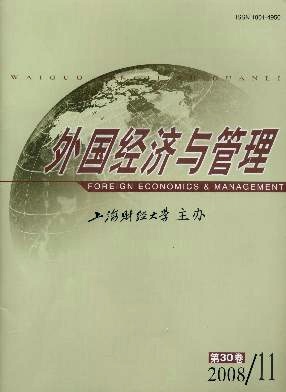企业文化力内涵、生成与功能体系研究综述及其展望
外国经济与管理 2008 年 第 30 卷第 11 期, 页码:51 - 56
摘要
参考文献
摘要
企业文化力是指企业文化对竞争力的作用或影响力。本文在梳理近年来国外学者有关企业文化力的形成,以及企业文化力提升企业竞争力的作用的主要研究成果之基础上,指出企业文化力是内嵌于企业组织、技术和管理之中的"核心",与企业绩效具有密不可分的关系;在匹配机制上,企业文化力对企业具有整合、激励、导向和预防功能。因此,企业文化力是企业谋求永续生存和发展的重要因素,可形成企业的竞争优势。
[1]Anne,H.Knowledge acquisition for expert system[M].London:Kongan Page,1986.
[2]Jing,Runtian,and Graham,John.Values versus regulations:How culture plays its role[J].Journal of Business Ethics,2008,80(4):791-806.
[3]Davis Lenita,Sijun Wang,and Andrew Lindridge.Culture influences on emotional responses to on-line store atmospheric cues[J].Journal of Business Ethics,2008,80(4):807-822.
[4]Huang,Chi-Cheng,Chu,Pin-Yu,and Chiang,Yu-Hsiu.A fuzzy AHP application in government-sponsored R&D project selection[J].Omega,2008,36(6):1 038-1 052.
[5]Barney,J B.Organizational culture:Can it be a source of sustained competitive advantage?[J].Academy of Management Review,1986,11:656-665.
[6]Camerer C Vepsalainen.The economic efficiency of organizational culture[J].Strategic Management Journal,1988,9:115-126.
[7]Denison,D R,and Mishra,A K.Toward a theory of organizational culture and effectiveness[J].Organization Science,1995,6:204-223.
[8]Harrison,R.Questionaire on the cultures of organizations[M].London:Souvenir,2007.
[9]Pamela S Lewis,Stephen H Goodman,and Patricia M Fandt.Management challenges in 21st century[M].NY:West PublishingCompany,1995.
[10]Fayolle,Alain,Basso,Olivie,and Legrain,Thomas.Corporate culture and values:Genesis and sources of L’Or啨al’s entrepreneur-ial orientation[J].Reviewof Small Business&Entrepreneurship,2008,21(2):215-229.
[11]Danny F Sondakh,and Kanes K Rajah.Developing an entrepreneurship culture:The Greenwich experience international[J].Jour-nal of Entrepreneurship and Innovation,2006,7(4):2-10.
[12]Barton,D L.Core capability and core rigidities:Aparadoxin managing newproduct development[J].Strategic Management Jour-nal,1992,13:111-125.
[13]Stalk,George,Evans,Philip,and Shul man,Larence E.Competing on capabilities:The newrules of corporate strategy[J].Har-vard Business Review,1992,70(2):57-69.
[14]Richardson,G B.The organization of industry[J].Economic Journal,1972,82:883-896.
[15]William,Allan,Dobson,Paul,and Walters,Mike.Changing culture[R].Working Paper,Institute of Personnel Management,1989.
[16]Winter,Sidney G.Deliberate learning and the evolution of dynamic capabilities[J].Organization Science,2002,(3):339-351.
[17]Denison,D R,and Mishra,A K.Toward a theory of organizational culture and effectiveness[J].Organizational Science,1995,(6):204-223.
[18]Guest,E D.On meaning,metaphor and psychological contract:Aresponse to Rousseau[J].Journal of Organizational Behavior,1998,19:673-677.
[2]Jing,Runtian,and Graham,John.Values versus regulations:How culture plays its role[J].Journal of Business Ethics,2008,80(4):791-806.
[3]Davis Lenita,Sijun Wang,and Andrew Lindridge.Culture influences on emotional responses to on-line store atmospheric cues[J].Journal of Business Ethics,2008,80(4):807-822.
[4]Huang,Chi-Cheng,Chu,Pin-Yu,and Chiang,Yu-Hsiu.A fuzzy AHP application in government-sponsored R&D project selection[J].Omega,2008,36(6):1 038-1 052.
[5]Barney,J B.Organizational culture:Can it be a source of sustained competitive advantage?[J].Academy of Management Review,1986,11:656-665.
[6]Camerer C Vepsalainen.The economic efficiency of organizational culture[J].Strategic Management Journal,1988,9:115-126.
[7]Denison,D R,and Mishra,A K.Toward a theory of organizational culture and effectiveness[J].Organization Science,1995,6:204-223.
[8]Harrison,R.Questionaire on the cultures of organizations[M].London:Souvenir,2007.
[9]Pamela S Lewis,Stephen H Goodman,and Patricia M Fandt.Management challenges in 21st century[M].NY:West PublishingCompany,1995.
[10]Fayolle,Alain,Basso,Olivie,and Legrain,Thomas.Corporate culture and values:Genesis and sources of L’Or啨al’s entrepreneur-ial orientation[J].Reviewof Small Business&Entrepreneurship,2008,21(2):215-229.
[11]Danny F Sondakh,and Kanes K Rajah.Developing an entrepreneurship culture:The Greenwich experience international[J].Jour-nal of Entrepreneurship and Innovation,2006,7(4):2-10.
[12]Barton,D L.Core capability and core rigidities:Aparadoxin managing newproduct development[J].Strategic Management Jour-nal,1992,13:111-125.
[13]Stalk,George,Evans,Philip,and Shul man,Larence E.Competing on capabilities:The newrules of corporate strategy[J].Har-vard Business Review,1992,70(2):57-69.
[14]Richardson,G B.The organization of industry[J].Economic Journal,1972,82:883-896.
[15]William,Allan,Dobson,Paul,and Walters,Mike.Changing culture[R].Working Paper,Institute of Personnel Management,1989.
[16]Winter,Sidney G.Deliberate learning and the evolution of dynamic capabilities[J].Organization Science,2002,(3):339-351.
[17]Denison,D R,and Mishra,A K.Toward a theory of organizational culture and effectiveness[J].Organizational Science,1995,(6):204-223.
[18]Guest,E D.On meaning,metaphor and psychological contract:Aresponse to Rousseau[J].Journal of Organizational Behavior,1998,19:673-677.
引用本文
聂清凯, 赵庆. 企业文化力内涵、生成与功能体系研究综述及其展望[J]. 外国经济与管理, 2008, 30(11): 51–56.
导出参考文献,格式为:
下一篇:组织结构维度研究理论与方法评介





 6451
6451  289
289

